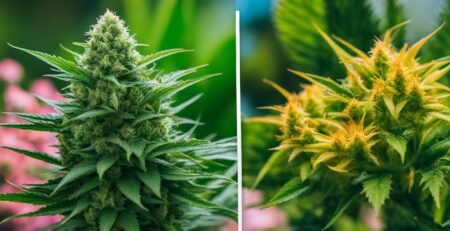CBD for Back Pain Relief: Discover Benefits
The quest for alleviating back pain has led many to turn towards CBD oil for back pain, a natural remedy that's gaining traction and showing promise in initial studies. As a potential alternative treatment for back pain, CBD, or cannabidiol, has emerged amidst a sea of traditional options, offering a ray of hope for those looking for relief. The burgeoning interest in cbd treatment for back pain stems from its interaction with the body's endocannabinoid system and its touted anti-inflammatory properties. This has opened up new avenues for those suffering from chronic discomfort, seeking options beyond pharmaceuticals.
Our comprehensive analysis seeks to unwrap the layers of anecdotal and scientific evidence surrounding CBD and its efficacies. As we delve deeper into this natural substance, we tap into its complexities and explore its role as a possible safe haven for back pain sufferers.
Key Takeaways
- Emerging evidence highlights CBD as a promising natural remedy for various forms of back pain.
- CBD is gaining popularity as an alternative treatment pivotal in managing chronic back discomfort without the risks associated with conventional drugs.
- Interactions with the endocannabinoid system may enable CBD to offer pain and inflammation relief.
- CBD oil for back pain represents a holistic approach in the broader spectrum of nonprescription healthcare products.
- Understanding the potential of CBD treatment for back pain is essential in an era where alternative and integrative medicine is increasingly valued.
Understanding CBD’s Role in Pain Management
As we delve into the world of cannabidiol (CBD) and its implications for back pain, it becomes clear that its role extends far beyond that of a mere supplement. CBD is lauded for its nonpsychoactive pain management properties, distinguishing it from other cannabinoids in cannabis. This attribute alone has propelled CBD to the forefront of natural remedies for conditions like chronic back pain, with many individuals seeking its benefits for a more holistic approach to pain relief.
Non-Psychoactive Components in Pain Relief
Unlike its psychoactive counterpart, tetrahydrocannabinol (THC), CBD does not induce a euphoric high. Instead, it stands out as a component that delivers relief while allowing recipients to maintain clarity of mind. This distinct advantage is integral to its appeal among those requiring ongoing pain management without the impairment often associated with more conventional pain medications. Indeed, the nonpsychoactive nature of CBD is what lends credibility to its usage in professional and daily settings alike.
How CBD Utilizes the Endocannabinoid System
The interaction of CBD with the body's endocannabinoid system is a focal point for understanding its effects on pain and inflammation. By influencing this system, CBD potentially aids the body in using its own endocannabinoids more effectively. This can lead to enhanced levels of anandamide, known for its role in regulating pain signals, providing not only relief but also improved mood. The ripple effect of this interaction could be significant for those suffering from conditions like chronic back pain, offering a beacon of hope in the realm of nonprescription remedies.
The Science Behind CBD for Back Pain
Exploring the efficacy of CBD oil for back pain reveals a body of scientific study predicated on animal research, suggesting robust anti-inflammatory potential. Research, notably a pivotal study conducted in 2015, illustrates how CBD gel significantly reduced pain and swelling in animal subjects afflicted with arthritis. The absence of negative effects on exploratory behaviors of these subjects proposes that the CBD's therapeutic effects may bypass the brain functions often impaired by traditional pain medications.
When transitioning from animal to human studies, the intricacies unfold further due to legal regulations shaping research protocols. However, preliminary findings from human trials indicate a beneficial trend, pointing towards cbd for lower back pain management. While most of these studies amalgamate CBD with THC, efforts to untangle the sole effects of CBD are increasingly prevalent. Encouragingly, large-scale clinical trials are now probing more deeply into CBD's standalone impact on the multifaceted nature of back pain.
Let's consider the 2015 study's findings as summarized in the following table:
| CBD Application | Effect on Pain and Swelling | Impact on Exploratory Behavior | Dosage |
|---|---|---|---|
| Topical Gel | Significant reduction in joint swelling and pain | No adverse effects noted | 6.2 mg/day and 62 mg/day |
| Placebo | No change in symptoms | No adverse effects noted | N/A |
These findings bolster the hypothesis that CBD oil for back pain could manifest as a viable natural alternative, bypassing the complexities of traditional pharmacology. This research lays a foundation for ongoing studies and strengthens the dialogue around CBD's role in pain modulation—specifically targeting the inflammatory underpinnings of various types of back pain.
With the legal and societal landscape continually evolving, the study of cannabinoids like CBD becomes less encumbered, promising more comprehensive insights into their utility in pain management.
Types of Back Pain and CBD Efficacy
When it comes to back pain, not all discomfort is equal. The experience can range from a short-lived strain to an ongoing ordeal that impairs daily functioning. Here we explore how CBD, a compound derived from cannabis, is gaining attention as a potential natural remedy, particularly for back pain.
Acute vs. Chronic Back Pain: CBD’s Impact
Differentiating between acute and chronic back pain is essential to understand how CBD may be utilized effectively for relief. Acute back pain often involves sharp, sudden discomfort that can result from an injury or misalignment, lasting from days to a few weeks. On the other hand, chronic back pain persists, often for months or longer, irrespective of an initial injury's resolution. The impact of CBD cream for back pain in these contexts is an area of growing study.
Acute pain tends to respond to treatments that address the initial cause of pain, whereas chronic back pain requires a more long-term, multifaceted approach. CBD's properties suggest it can provide support in both scenarios, offering anti-inflammatory benefits that may mitigate immediate discomfort and possibly regulate pain signals over time to combat persistent pains.
Addressing Inflammatory Back Pain with CBD
Underlying much of the chronic back pain are conditions so torrid as arthritis or routine muscle strain; both are intertwined with inflammation's cold grasp. The anti-inflammatory prowess of CBD positions it as a natural remedy for back pain of this nature. As a cannabinoid, CBD has shown potential in interfacing with the body's own endocannabinoid system, which might modulate not just pain but inflammation itself.
Moreover, CBD's engagement with this system might help address central sensitization—a condition where the central nervous system becomes heightened, exaggerating pain. Through its interaction with the endocannabinoid receptors, CBD for chronic back pain might be a light in the tunnel of ongoing discomfort, helping to temper the amplified pain signals chronic patients often endure.
The following table captures a glance at how CBD's effects on these two types of back pain may play out:
| Type of Back Pain | Potential CBD Benefit |
|---|---|
| Acute Back Pain | May reduce inflammation and alleviate sharp, sudden pain |
| Chronic Back Pain | Potentially modulates persistent pain signals and offers long-term relief |
Personalizing CBD Usage for Back Pain
Unlocking the full potential of CBD for back pain involves personalized treatment strategies. Recognizing that back pain manifests differently in each individual, optimization of CBD usage can be transformative. The best CBD products for back pain are those tailored to align with specific patient profiles, taking into account the unique intensity, duration, and nature of their pain. Customization extends to not only product selection but also dosage and application methods, which are pivotal in enhancing the effectiveness of cbd treatment for back pain.
An individual's journey towards finding relief can vary considerably. For some, topicals are the preferred choice to target localized pain directly at the source, while others may find systemic relief through oral CBD products. Factors influencing these decisions often include the severity of pain, response to previous treatments, and personal lifestyle considerations. Understanding these aspects is crucial to crafting a CBD regimen that not only addresses pain but also improves overall quality of life.
To illustrate the personalized aspect of CBD treatments, consider the following table that captures the variability in product choice and administration methods based on different pain profiles:
| Pain Severity | Preferred CBD Product Type | Administration Method | Suggested Starting Dosage |
|---|---|---|---|
| Mild to Moderate | CBD Oil Tinctures | Sublingual | 10-20 mg per day |
| Moderate to Severe | CBD Capsules or Gummies | Oral Ingestion | 25-50 mg per day |
| Localized Discomfort | CBD Topicals (Creams/Balms) | Direct Application | Apply as needed |
| Chronic and Widespread | High Potency CBD Oil | Sublingual or Oral | 50+ mg per day |
By embracing a personalized approach to CBD usage, individuals can better manage their back pain. This can range from selecting the best CBD products for back pain to determining the most suitable delivery system, whether it be through oral, sublingual, or topical means. The emphasis on personalization is critical, as CBD's effects can vary broadly across different body types, health conditions, and back pain causes.
It's also worth noting that while the goal is to optimize relief, the process of finding the right CBD treatment for back pain can involve a degree of trial and feedback. Interaction with healthcare professionals can help to navigate this journey, ensuring that choices are informed and that any changes in regimen are made with care. Ultimately, the tailored use of CBD leverages its therapeutic potential to provide targeted relief and a higher quality of life for those suffering from back pain.
Exploring CBD Forms: Oils, Edibles, and Topicals
As individuals seek the best CBD products for back pain, they are met with a plethora of options, each tailored for different therapeutic needs and preferences. These formulations present a range of bioavailability rates and efficacies, impacting the way CBD interacts with the body's endocannabinoid system. By examining these variances, one can discern the most fitting application for their particular back pain circumstances.
Comparing Bioavailability and Efficacy
The term bioavailability refers to the proportion of CBD that enters the circulation when introduced into the body and is thus able to exert its effects. CBD oils, positioned as a popular choice, are known for their swift absorption when administered sublingually. This rapid ingress into the bloodstream enables a speedy onset of pain relief, making CBD oil for back pain a preferred option for many.
Conversely, CBD edibles and capsules undergo a more gradual absorption process, as they must navigate the complexities of the digestive system before being assimilated into the bloodstream. Although the onset time is delayed compared to oils, these forms offer a more prolonged release, potentially extending the pain-relieving benefits over a longer period.
Oils, edibles, and other CBD formulations are gaining traction in the realm of personal health. Each presents a unique pathway for alleviating discomfort, underscoring the dynamic nature of CBD as a versatile component in the management of back pain.
Targeted Treatment with Topical CBD Products
When pinpointing specific areas of discomfort, CBD cream for back pain emerges as a sound approach. Topical products are designed for direct application to the skin, delivering CBD to localized sites. The advantages of topicals lie in their ability to focus treatment on areas where pain is most intense, thus potentially providing targeted, immediate relief. Such localized application bypasses systemic circulation, which can be particularly valuable for those desiring localized effects without broader impact.
Creams, balms, and salves embody the capacity of CBD to be integrated seamlessly into a daily routine for pain management, offering an approachable form of therapy for back pain sufferers. As the market diversifies, the availability of these topicals strengthens, establishing them as a cornerstone in the growing range of best CBD products for back pain available to consumers.
Analyzing CBD Dosages for Pain Relief
The path to discovering the optimal CBD dosage for pain relief, particularly when addressing CBD for back pain, is an ongoing journey shadowed by extensive research and personal experimentation. Recognizing the complexity of back pain and the individuality of response to CBD, guidelines remain fluid, urging users to commence with modest dosages. Guidance by healthcare professionals, with a mindful approach to dosage adjustments, is paramount to tailor the cbd treatment for back pain to individual needs effectively.
It is essential to underscore that, as of now, the FDA has not sanctioned nonprescription CBD products for the direct treatment of pain. Regardless of this, the potential of cannabinoids to act as novel treatments in the realm of chronic pain persists within the medical community. Consequentially, the establishment of standard dosages remains undefined, fostering an environment in which consumers must navigate with attentiveness and medically-informed advice.
Given the lack of definitive FDA-approved guidelines, the starting point for using CBD often parallels the conservative adage, “start low and go slow.” Progressing gradually allows users to monitor the effects of CBD on their system while sidestepping potential discomfort that might come with higher, more concentrated dosages. Below is a table that suggests a generalized framework for initiating CBD dosages based on pain intensity:
| Level of Pain | Initial CBD Dosage Suggestion | Incremental Adjustment | Frequency of Administration |
|---|---|---|---|
| Mild Back Pain | 5-10 mg | Increase by 5 mg increments weekly | Once to twice daily |
| Moderate Back Pain | 10-20 mg | Increase by 10 mg increments weekly | Twice daily |
| Severe Back Pain | 20-40 mg | Increase by 10-20 mg increments weekly | Two to three times daily |
This table serves only as a generic reference; the individual experience with CBD for back pain may diverge vastly from one person to another. Factors such as the body's metabolism, the severity of pain, and the presence of other medical conditions purvey variability in how one might respond to CBD. Hence, any dosage adjustments should transpire under the vigilance of a healthcare provider who can oversee the progression and recommend alterations tailored to the patient's distinctive requirements.
The endeavor to accurately define the CBD dosage for pain relief is akin to navigating uncharted waters, yet the prevailing currents of anecdotal evidence and preliminary research provide encouragement. The pursuit of solace from back pain through CBD is undeniably interconnected with personal discernment and empirical wisdom.
Research and Studies Supporting CBD Benefits
The collective knowledge on the benefits of CBD for back pain is expanding, owing significantly to clinical trials and robust surveys. Scientific studies on CBD underscore its utility as a natural remedy for back pain, propelling further inquiry into its role as an alternative treatment for back pain.
Evidence from Clinical Trials
Stringent research protocols, mandated by clinical trials, shed light on the efficacy of CBD. As a therapeutic compound, CBD has been scrutinized under the rigorous conditions of clinical research, with outcomes suggesting a favorable effect on back pain management. Despite the complexities involved in transitioning from preclinical animal models to human subjects, the data collected so far provides a fundamental basis for continued exploration into CBD's analgesic properties.
Real-World Success Stories and Surveys
Anecdotal testimonials and survey results contribute a grassroots layer of evidence to the potential benefits of CBD for back pain. One such notable instance is a Gallup Poll, wherein participants reported significant relief from back pain after using CBD products. These real-world success stories, combined with ongoing clinical trials, herald an encouraging outlook for the use of CBD as a natural remedy for those suffering from chronic back distress.
| Evidence Type | Positive Impact Reported | Respondents' Perspective |
|---|---|---|
| Clinical Trial Outcomes | Indication of CBD's efficacy for pain management | Scientifically validated |
| Survey Results (e.g., Gallup Poll) | High percentage of reported relief from back pain | Consumer-driven insights |
Navigating Legal Landscape of CBD
As individuals across the nation seek out CBD for chronic back pain, they are confronted with a legal framework that is in a state of flux. With the increasing legalization of cannabis on a state-by-state basis, the opportunity for research into the therapeutic benefits of CBD has expanded, helping to erode the stigma these compounds once faced. However, this rapidly changing legal landscape presents unique challenges that both consumers and researchers must navigate with care.
Despite the widespread anecdotal acclaim, it's critical for prospective CBD users to remain well-informed about the current cbd oil legality in their specific locality. While hemp-derived CBD has been federally legal since the passing of the 2018 Farm Bill, stipulating that it must contain less than 0.3% THC, the psychoactive compound in cannabis, federal and state laws can diverge significantly. This divergence can create a confusing environment where a product may be considered legal in one state but not in another.
In addition to knowing the law, there's a heightened importance in understanding cbd product regulation. Currently, the Food and Drug Administration (FDA) does not regulate the safety and purity of dietary supplements. Thus, the onus lies on the consumer to ensure the quality and authenticity of CBD products. Without FDA approval, product labels may not accurately reflect the contents, so individuals must be vigilant in seeking out trustworthy sources, often verified through independent third-party lab testing.
Let us look into a summarized table demonstrating varied state regulations that impact CBD product accessibility and compliance:
| State | Legal Status of CBD | Notes |
|---|---|---|
| California | Legal with restrictions | Hemp-derived CBD legal; no CBD in food/beverages |
| Colorado | Fully legal | Both hemp and cannabis-derived CBD permitted |
| Florida | Legal with restrictions | Hemp-derived CBD legal; regulations on packaging and retail |
| New York | Legal with notable restrictions | Hemp-derived CBD products regulated; no CBD-infused food or beverages |
| Texas | Legal with restrictions | Hemp-derived CBD with less than 0.3% THC legal; medical program very restricted |
The table illustrates that while there's a general trend towards acceptance, the intricacies of cbd oil legality across states can influence how one accesses CBD for chronic back pain. Given these intricacies, coupled with the lack of standardized cbd product regulation, it is indispensable for consumers to be proactive — thoroughly researching the products they intend to use and remaining cognizant of the legalities in their specific regions.
In conclusion, while the landscape for CBD and its use for chronic back pain is promising, it necessitates a responsible approach for both compliance and personal safety. By staying abreast of the laws and regulations, consumers can make informed decisions, reaping the potential benefits of CBD while adhering to the legal framework of their locale.
Comparing Full Spectrum, Broad Spectrum, and CBD Isolate
When searching for the best cbd products for back pain, understanding the differences between Full Spectrum CBD, Broad Spectrum CBD, and CBD Isolate is essential. These forms of CBD each offer unique benefits and experiences, influenced by the diversity of compounds present in the extract.
Understanding the ‘Entourage Effect’
Full spectrum CBD is renowned for its collection of cannabis plant compounds, including a trace amount of THC. This variety is reputed for the ‘entourage effect,' a phenomenon where the combined effect of cannabinoids, terpenes, and other plant components can enhance the overall therapeutic impact. It's considered by many to be the most holistic approach to harnessing the plant's potential for conditions like back pain.
Choosing the Right CBD for You
Broad Spectrum CBD presents a middle ground, offering a full cadre of cannabinoids except for THC. This option is preferred by users who want to avoid the compound due to personal preferences or drug testing concerns. On the other end of the spectrum, CBD Isolate is the purest form of CBD, ideal for those who wish to consume CBD exclusively, free from other cannabinoids and plant materials. Your choice between these types may influence the efficacy and experience in managing back pain symptoms. Personal needs and health goals should guide your decision to ensure optimal benefits.

The following table compares these three types of CBD, assisting individuals in making an informed decision for managing back pain:
| Type of CBD | Contains THC | Entourage Effect | Best for |
|---|---|---|---|
| Full Spectrum CBD | Yes ( | Possible | Those seeking a holistic approach |
| Broad Spectrum CBD | No | Less likely | Individuals concerned about THC |
| CBD Isolate | No | No | Users looking for only CBD |
Whether you select Full Spectrum CBD for its synergistic potential, Broad Spectrum CBD for a THC-free experience, or CBD Isolate for its singular purity, the key is to align your choice with your wellness needs and the requirements for managing back pain effectively.
‘CBD for Back Pain’: Addressing Common Concerns
When exploring the use of CBD oil for back pain, consumers frequently voice concerns regarding the quality and efficacy of such products. To address these concerns, it's critical to underline the importance of careful consideration of product quality, transparency, and recommended dosages. Here we examine the considerations crucial to making informed decisions about using CBD as a potential remedy for back pain.
With the rise of cbd for lower back pain and cbd for chronic back pain as popular topics of discussion, here are important factors to bear in mind:
- **Product Quality**: Ensuring the CBD product is of high quality is paramount. This includes verifying that the product has been third-party tested to confirm its cannabinoid content and purity. The absence of contaminants such as pesticides, heavy metals, and mould should be ascertained.
- **Label Accuracy**: Manufacturers of CBD products should provide thorough and accurate product labeling. This gives consumers insight into the amounts of CBD and other compounds within the product, fostering trust and ensuring an understanding of product potency.
- **Source of Hemp**: As the hemp plant is known for its bioaccumulative properties—absorbing substances from the soil and environment—it is cultivated in; investigating the geographical source of hemp used in CBD production is advisable.
- **Dosage and Administration**: The appropriate dosage of CBD can vary significantly among individuals. Those considering CBD for managing back pain should start with the lowest possible dose and gradually increase as required, tailoring it to their response and comfort level.
- **Realistic Expectations**: It is essential for consumers to have realistic expectations regarding the efficacy of CBD in managing pain. While initial studies and anecdotal reports indicate potential benefits, CBD may not provide immediate or miraculous relief.
- **Consult Healthcare Providers**: Before adding CBD oil for back pain to one's wellness regimen, consulting with healthcare professionals is advisable. This ensures the safe and appropriate use of CBD, especially for those with underlying health conditions or who are taking other medications.
Moreover, to guide potential users in selecting a CBD product that aligns with their health objectives, consider the following table:
| Product Aspect | Considerations |
|---|---|
| Types of CBD Products | Choose from oils, edibles, creams—each suited for different needs and preferences. |
| Potency and Purity | Seek out products with clear, stated potency and no unnecessary additives. |
| Method of Extraction | CO2 extraction method is widely regarded for producing clean and safe CBD extracts. |
| Brand Reputation | Opt for brands with positive reviews, transparent practices, and a commitment to quality. |
| Customer Support | Accessible, knowledgeable customer support indicates a brand's reliability and accountability. |
It is noteworthy that while the market offers a range of options for best CBD products for back pain, meticulous attention to these factors will facilitate making an educated choice and potentially contribute to achieving desired health outcomes.
Potential Side Effects and Safety Considerations
When considering CBD cream for back pain as a therapeutic option, it is important for individuals to be cognizant of the safety of CBD products and the potential side effects of CBD. While many experience positive outcomes with minimal adverse responses, some side effects can occur. Understanding these risks is key to a responsible approach to incorporating CBD into pain management routines.
Interactions with Medications
One critical safety consideration is how CBD interacts with other medications. CBD can affect how drugs are metabolized in the body, particularly those processed by cytochrome P450 enzymes. This could potentially alter the concentration of these drugs in the bloodstream and impact their efficacy or lead to unwanted side effects. Consequently, those considering CBD use should discuss their current medications with a healthcare professional to navigate this complex area safely.
Listening to Your Body: Adverse Reactions
Even with the perceived safety of CBD products, listening to the body's reactions during CBD use is vital. Adverse responses such as fatigue, changes in appetite, or gastrointestinal issues could manifest. It is recommended that individuals start with a lower dosage and monitor their body's response closely, adjusting usage as needed. Consultation with a healthcare provider is essential, especially when adverse reactions are noted, to ensure that the use of CBD, whether via a CBD cream for back pain or other forms, is optimized for both safety and efficacy.
Below is a table that outlines potential side effects and safety considerations to bear in mind when using CBD:
| Side Effects | Medications Interaction | Recommended Action |
|---|---|---|
| Fatigue | Drugs metabolized by P450 enzymes | Consult healthcare professional |
| Changes in appetite | Blood thinners (e.g., warfarin) | Monitor blood levels |
| Gastrointestinal discomfort | Seizure medications (e.g., clobazam) | Adjust dosage with guidance |
Integrating CBD into Your Wellness Routine
As the narrative around wellness broadens to include nature-derived treatments, cannabinoids like CBD have sparked interest for those struggling with persistent discomforts such as back pain. CBD for back pain is becoming synonymous with a new era in natural health practices, recognized not only as a complementary aid alongside diet and exercise but as a standalone remedy to enhance one's quality of life.
Incorporating CBD oil for back pain into a daily wellness regime requires thoughtful consideration of lifestyle choices, emphasizing a balanced approach that holistically targets discomfort. Whether it's through sublingual drops, ingestible capsules, or topical creams, CBD has emerged as a natural remedy for back pain that offers customizable solutions in line with individual needs and preferences.
The alignment of a CBD treatment for back pain with routine physical activities or stress-reduction techniques forms a strategic alliance, aimed at mitigating the adverse effects of chronic pain conditions. Such routines are paced to facilitate gradual adaptation, ensuring a seamless integration of CBD's natural soothing properties with the body's innate healing processes.

For many, the introduction of CBD into their wellness journey is more than just symptomatic relief; it is an embodiment of embracing a more natural pathway towards health. The allure of CBD stems from its multifaceted approach, capable of addressing not just the physical symptoms but also the often-overlooked emotional toll that chronic back pain can exact.
To further dwell upon the practicalities of incorporating CBD into one's health regime, consider the following table, which outlines some suggested methods:
“A tailored regimen with the appropriate form and dosage of CBD can contribute to comprehensive back pain relief strategies, potentially enhancing overall well-being and improving life quality.”
| Method of Incorporation | Dosage Guidelines | Complementary Practices |
|---|---|---|
| Sublingual CBD Oil Drops | Start with a lower concentration and adjust as needed | Mindful meditation and adequate water intake |
| Oral CBD Capsules | Maintain a consistent schedule to monitor effects | Anti-inflammatory diet and regular exercise |
| Topical CBD Creams | Apply to target areas as per requirement | Physical therapy and targeted stretching routines |
Navigating the complexities of chronic back pain often leaves many feeling as though they have exhausted all options. However, the burgeoning recognition of CBD as a natural remedy for back pain is changing the landscape of pain management. Through strategic integration into a holistic wellness routine, CBD enkindles a beacon of hope for those seeking alternatives in their journey to reclaiming comfort and mobility.
Conclusion
The exploration into the benefits of CBD for back pain relief presents a landscape teeming with potential, underscored by promising narratives from users and preliminary scientific indicators. As our society treads the path of understanding and integrating CBD into pain management strategies, we bear witness to natural treatment options carving out a niche in the therapeutic world.
Moving Forward with CBD for Back Pain Relief
Advancing our collective journey with CBD demands a dual approach—upholding a well-informed community alongside concerted efforts in research. Awareness about dosage, spectrum of CBD products, and the nuance of personal pain stories encourages a future where individuals navigate CBD choices with confidence and experience the accompanying relief in a safe manner.
The Future of CBD Research and its Implications
Enthusiasm brews around the future of CBD research, anticipating a more profound grasp of its diverse applications, particularly within the realm of back pain alleviation. This fervor for knowledge impels the pursuit of rigorous clinical studies that aim to elucidate the full gamut of implications tied to CBD's use, possibly revolutionizing our approach to chronic pain management. With the support of evolving legal landscapes and sustained scientific curiosity, CBD's journey embodies the merging of natural wellness with methodical inquiry—a testament to the growth of alternative health solutions in contemporary society.
FAQ
What are the benefits of using CBD for back pain?
CBD is recognized for its potential to reduce inflammation and alleviate pain, making it a natural remedy for back pain. Its interaction with the body's endocannabinoid system can offer pain relief and reduce inflammation without the risks associated with traditional pain medications.
How does CBD provide pain relief without causing a “high”?
CBD is nonpsychoactive, meaning it does not interact with the brain receptors that THC does. It provides relief by influencing the body to use its own endocannabinoids more effectively for regulating functions like pain.
Can CBD help with both acute and chronic back pain?
Yes, CBD's anti-inflammatory properties can help with acute back pain often resulting from injuries or strains. Meanwhile, its ability to modulate the endocannabinoid receptors may provide relief for chronic back pain by addressing pain signal amplification.
What forms of CBD are most effective for back pain relief?
The effectiveness of CBD forms can depend on the type of back pain and personal preferences. CBD oils offer systemic relief and can be absorbed quickly, edibles release CBD more slowly, while topicals provide localized relief. Each form aims to utilize CBD's anti-inflammatory and pain-relieving properties.
How does one determine the right CBD dosage for back pain relief?
The ideal dosage of CBD can vary among individuals. It is recommended to start with a low dose and gradually increase it while monitoring the effects. Consulting with a healthcare professional can also guide dosage determination.
Are there any clinical trials or studies that support the use of CBD for back pain?
Yes, there are several studies, including animal studies and human surveys, that suggest positive outcomes of using CBD for pain relief. However, large-scale clinical trials are still ongoing to further understand the effectiveness of CBD for back pain.
What legal considerations should one keep in mind when using CBD for back pain?
It is important to stay informed about local laws concerning CBD usage, which can vary between federal and state levels. Ensuring that the products you use are legal in your area and checking product labels for compliance are critical steps.
What is the difference between full spectrum, broad spectrum, and CBD isolate?
Full spectrum CBD contains all cannabinoids and terpenes found in the cannabis plant, which can work synergistically. Broad spectrum offers most compounds except THC, and CBD isolate provides only CBD, with no other cannabinoids or terpenes.
How should I evaluate product quality when selecting CBD for back pain?
Look for products that disclose their hemp source and provide third-party lab testing results to ensure quality. It's also wise to verify that the product contains the advertised amount of CBD and is free from contaminants.
Are there any known side effects or safety concerns associated with using CBD for back pain?
While CBD is generally well tolerated, some may experience side effects such as fatigue, appetite changes, or gastrointestinal issues. It's also important to be aware of potential interactions with other medications and to consult with a healthcare provider if you're considering CBD for back pain.
Can I integrate CBD into my existing wellness routine for back pain management?
Yes, CBD can be integrated into your wellness routine. It can complement other lifestyle factors like a healthy diet, exercise, and stress management techniques. Tailoring CBD form and dosage to fit your routine can aid in comprehensive back pain relief strategies.










Leave a Reply